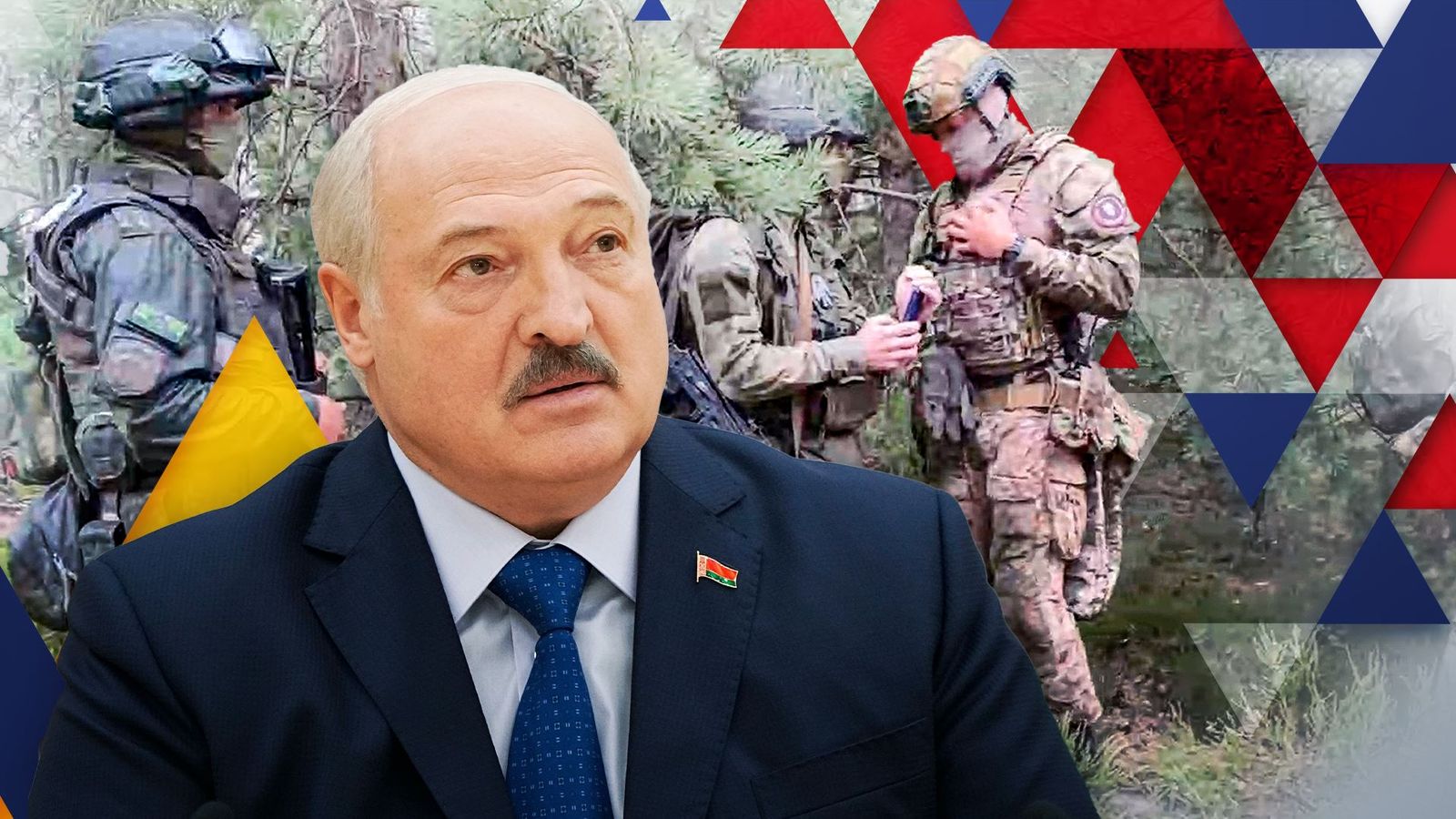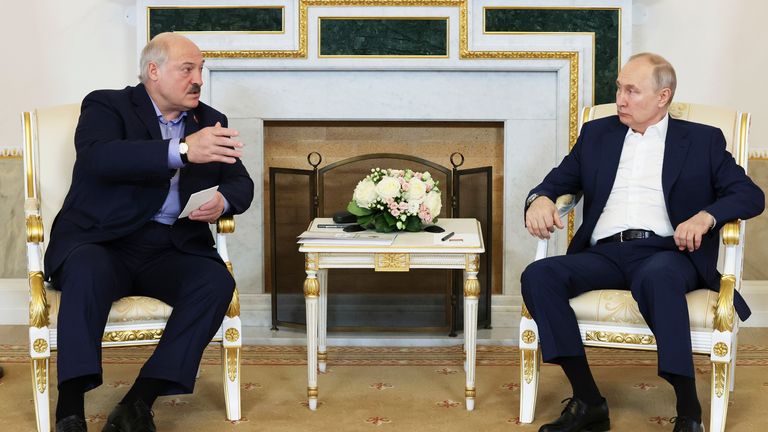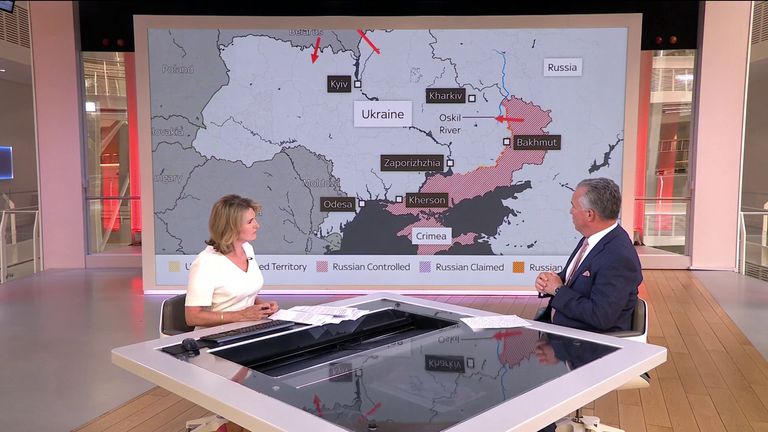Described as the “last European dictator”, Belarusian President Alexander Lukashenko has been escalating tensions with NATO.
But is he close to embroiling his country in the Russia-Ukraine war – against the wishes of his electorate?
In post since July 1994, despite growing levels of internal dissent, the Belarusian leader has been kept in power by increasing levels of Russian support, while Mr Lukashenko has recently been emboldened by the presence of Wagner Group mercenary fighters in his country.
But this has led to heightened tensions with Poland (a member of NATO) and reported threats near the border, which risks tainting his legacy by embroiling Belarus in Russia’s war in Ukraine.
Mr Lukashenko is a wily politician who has kept a firm grip on power for the past three decades. An advocate for a “state union” with the Russian Federation, many analysts believe Mr Lukashenko sees himself as the natural successor to President Putin.
However, Mr Lukashenko also recognises that popular Belarusian opinion does not support closer ties with Russia, and polls suggest there is almost no support for Belarus entering the war with Ukraine.
As a result, Mr Lukashenko must balance the oft-conflicting ambitions of the Russian leader and his own electorate.
Following Yevgeny Prigozhin’s abortive coup attempt six weeks ago, it was widely reported that Mr Lukashenko was responsible for brokering a deal to persuade Prigozhin to abandon his rebellious march.
President Putin was clearly rattled by the most significant threat to his authority in decades and needed time to consolidate his position and reassert his authority, and so Mr Lukashenko’s intervention provided an invaluable lifeline to the embattled Russian president.
Vladimir Putin also needed to remove the immediate threat of Wagner, so Mr Lukashenko offered to base the mercenary group and its leader Prigozhin in Belarus as a short-term palliative.
This invaluable support at such a critical time for Mr Putin also provided Mr Lukashenko with a fleeting opportunity to bask in the international spotlight and exploit a rare moment of leverage in his relations with Russia.
Mr Lukashenko goaded Poland, implying that Wagner forces based in Belarus posed a threat to them, and that Mr Lukashenko should be thanked for stopping the Wagner fighters from “going on a trip to Warsaw and Rzeszow”.
There were also reports of Belarusian helicopters involved in border violations – all designed to heighten tensions with Belarus’s NATO neighbours.
However, this inflammatory rhetoric by the Belarusian leader made him the second-most popular leader in Russia – perhaps his target audience.
Mr Lukashenko’s regular media appearances were further evidence that he was enjoying his “15 minutes of fame”.
But, as President Putin gradually reasserted his authority, reshuffled his senior commanders and consolidated his powerbase, his attention started to turn to Wagner – and Prigozhin in particular.
Some Wagner mercenary fighters were assimilated into the Russian army, while many were re-deployed to Wagner’s Africa operation – all designed to erode Prigozhin’s powerbase.
Those Wagner fighters that remained in Belarus had no immediate role, yet mercenaries follow the money, so who would pay them?
Mr Lukashenko initially assumed that Russia would pay, but that has not transpired, and neither he nor Mr Putin want the remnants of a coup attempt to become “guns for hire”, so reports suggest that Mr Lukashenko is now seeking to evict Wagner as a “damage limitation” exercise.
Read more:
Vladimir Putin won’t ‘whack’ Wagner boss, says Belarus leader
Photo of Alexander Lukashenko published after he missed key events
A few Wagner mercenaries will remain to conduct military training for Belarus – training that had been conducted by Russian soldiers, thus freeing the latter for military duties in Ukraine.
Meanwhile, although Mr Lukashenko has exploited his brief opportunity for international sabre-rattling and increased leverage with President Putin, he must now try to navigate the fallout from this episode.
Vladimir Putin’s ambition remains to draw Belarus into the conflict with Ukraine, and although Mr Lukashenko recognises the risks associated with such an unpopular move, his future remains inexorably linked to that of the Russian leader.
If President Putin fails, so does Mr Lukashenko, and that is not the legacy that the Belarusian leader has planned.
President Lukashenko is an opportunist who sought to capitalise on President Putin’s brief window of vulnerability.
But, notwithstanding Mr Lukashenko’s personal ambitions, his increasingly erratic and unpredictable rhetoric has increased tensions between Belarus and NATO, but also perhaps betrayed his true ambitions to an increasingly sceptical Belarusian electorate.
Presidents Putin and Lukashenko are increasingly autocratic leaders whose egotistical self-serving actions risk escalating the war in Ukraine.
More disturbingly, their increasingly erratic and unpredictable behaviour is not grounded in the support of the Russian and Belarusian people, is evidently dictatorial, and has increasingly grave consequences for global peace and security.


